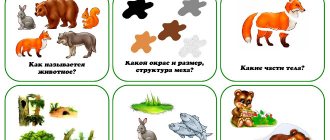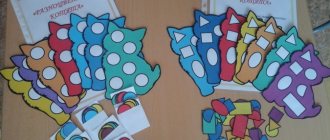Quest as a modern pedagogical technique in older preschool age
A person is then in the full sense a person if he is a person who plays, and therefore creates, that is, creates his own world in the game.
F. Schiller
According to A. Gin, “Pedagogical techniques are the basis of successful teaching and the teacher’s ability to constantly improve a modern lesson, find new approaches to teaching students that allow them to increase cognitive interest in the subject being studied and the quality of students’ knowledge” [4]. The development of a child occurs due to his active activity. The basic principles of the educational program for preschool children are implemented during classes through methods and techniques for teaching preschoolers. In this case, the method should be considered methods of influencing or transferring knowledge. Techniques are implemented thanks to variants of application of a certain method. Therefore, methods and techniques for teaching preschoolers can be practical, visual, verbal and playful.
One of the most interesting and close forms of organizing the pedagogical process for students is play. The Great Soviet Encyclopedia notes: “Game is a type of meaningful unproductive activity, where the motive lies not in its result, but in the process itself” [5].
Through play, the teacher helps the child gain the necessary motivation, which should be based on individual needs, provide freedom of choice, and provide the opportunity to acquire the necessary knowledge and skills.
The role of play activity and children's play as such in solving problems of the comprehensive development and education of preschool children is indisputably recognized in pedagogy.
Play for a child is the most attractive, natural form and means of learning about the world, their capabilities, self-expression and self-development. For a teacher, a meaningful, properly organized game that meets the interests of children is an effective pedagogical tool that allows them to comprehensively solve a variety of educational and developmental tasks.
In the game, a child is comprehensively prepared for life, from which it follows that games are associated with all types of human activity and act as a specifically children's form of knowledge, work, communication, art, and sports.
The originality of the modern pedagogical process of kindergarten is predetermined by new requirements for preschool education. The Federal State Educational Standard states that pedagogical interaction between a child and raising adults should be focused on ensuring the development of each child, preserving his uniqueness and identity, creating opportunities for the development of abilities and inclinations.
But you should not reduce the importance of the child’s motor activity for his harmonious development. The integration of these types of activities makes it possible to successfully solve the problems of forming a motor culture, developing children’s physical abilities, introducing a healthy lifestyle, health preservation and health formation. These conditions are implemented most effectively during quest games.
In modern conditions and approaches to preschool education in accordance with the Federal State Educational Standard for Preschool Education, quest games are quite relevant. According to the authors Gavrishova E.V., Milenkova.M. “Quest games are a new way of interaction in independent, playful activities of children, promoting cooperation between adults and children, their initiative and independence. Currently, a variety of innovative technologies are actively used in preschool education. It should be noted that the quest technology is relevant in the context of the requirements of the Federal State Educational Standard for Educational Education. This is an innovative form of organizing children's educational activities in preschool education, which contributes to the development of the child's active activity position in the course of solving game search problems. Thus, a quest - a game - is a child’s activity in which he, independently or together with an adult, discovers new practical experience and acquires knowledge” [3].
Quest technology in the educational and general educational process as a concept appeared relatively recently. It must be said that not only child psychologists played a big role in this, but also computer games of the quest genre that appeared a couple of decades ago. Let's try to consider the main aspects related to understanding this process, not from a scientific point of view, but let's talk about this topic in a universal human language, so that everyone can understand, for example, what quest technologies are in the education and upbringing of the younger generation.
It should be noted according to Bachurina. V., that “the modern world is very eventful and many different organizations are ready to offer the child interesting forms of pastime, which makes the already classic forms of organizing the pedagogical process less attractive and evoking less vivid emotions among students. And, as you know, without interest there is no result or it is achieved to a lesser extent” [2].
In this situation, the quest game acts as an assistant to the teacher in organizing the pedagogical process and implementing the assigned pedagogical tasks in a form that is unusual for students, thereby increasing their interest and emotional return.
““Quest” or “Adventure game” (translit. English: Quest - search, Adventure - adventure) is one of the main genres of games that require the participant to solve mental problems to advance through the plot. The plot can be predetermined or give many outcomes, the choice of which depends on the actions of the player.
The concept of “quest” in pedagogical science is defined as a specially organized type of research activity, for which the student searches for information at specified addresses (in reality), including the search for these addresses or other objects, people or tasks” [6].
The relevance of using quests today is recognized by everyone. The new generation Federal State Educational Standard requires the use of activity-type technologies in the educational process. Life shows that modern children better assimilate knowledge in the process of independently obtaining and systematizing new information. The use of quests contributes to the education and development of personality traits that meet the requirements of the information society, the discovery of abilities and the support of children's giftedness.
The concept of “quest” was first used as a literary term. This is the name of a method of constructing a plot, where the achievement of a goal by the main character occurs through overcoming numerous difficulties. For example, any work by Jules Verne or Robert Stevenson. The quest is also the basis of N. Nosov’s fairy-tale trilogy “The Adventures of Dunno and His Friends.”
As the analysis of the terms showed, “quest (English quest), or adventure game (English adventure game) is one of the main genres of computer games, which is an interactive story with a main character controlled by the player. The most important elements of a quest game are the actual narrative and exploration of the world, and a key role in the gameplay is played by solving puzzles and tasks that require mental effort from the player. Quests are games in which the player needs to look for various objects, find a use for them, talk with various characters in the game, solve puzzles, etc.“ [7].
Quest game technology fits perfectly into the pedagogical process in preschool educational institutions. Quest - an activity can be intended for both group and individual work.
In the process of working on such a quest project, the student comprehends real processes, experiences specific situations, and becomes involved in penetrating into the depths of phenomena and constructing new processes and objects. From the point of view of information activities, when working on a quest project, its participant requires the skills of searching, analyzing information, the ability to store, transmit, compare and synthesize new information based on comparison.
But the highlight of this organization of play activity is that, having completed one task, children receive a hint to complete the next one, which is an effective means of increasing motor activity and motivational readiness for cognition and exploration.
The popularity of quest games and their success among children can be explained by two reasons. Firstly, this is an enjoyable activity for the child. Secondly, the player understands the significance of its immediate result for himself. It can satisfy personal needs for goal achievement, dominance, independence, and the desire to be in the company of others.
An open quest lesson is held in kindergarten in order to demonstrate to colleagues, as well as parents of their students, positive practical developments in the use of modern gaming technology. The teacher visually presents original ways of organizing and conducting a quest game, original scenario ideas and teaching aids, presents a set of interesting tasks, shares teaching experience, invites to discuss innovative methods and exchange opinions.
Choosing a topic for open display or the preparation process is no different from working on a regular activity in the quest game format, and yet an open quest activity must meet certain conditions:
High level of professional training of the teacher conducting the quest game.
Focus on educational work with teachers and psychologists, including methodological master classes and the transfer of innovative experience in the process of the final discussion of the quest methodology.
Presentation of the results of the teacher’s work within the framework of the topic of self-education on the use of interactive games in working with students.
Demonstration of the effectiveness of gaming technology that meets the requirements of the Federal State Educational Standard.
The need for psychological preparation of children for the presence of a large number of strangers.
The main criteria for a quality quest are:
compliance with safety rules;
originality of the theme and script;
consistency of tasks and integrity of the plot;
creating an attractive and vibrant play space.
Quest game technology is constantly used by a physical education instructor and a speech therapist teacher in classes in kindergarten No. 14 “Spikelet” in the village of Bobrovy Dvory
During these games, a comprehensive solution to problems proposed by T. S. Ovchinnikova is provided, such as:
“Educational
‒ to expand and consolidate children’s knowledge about a healthy lifestyle from childhood, to bring them to the understanding that every person should take care of their health from childhood.
‒ teach, clarify and consolidate knowledge about sports, personal hygiene skills, healthy and unhealthy foods, knowledge of sports and physical education for a healthy lifestyle, form children’s ideas about the dependence of health on physical activity, hardening, and adherence to a daily routine.
‒ learning to solve educational problems by conducting experiments;
- training in independent inference;
- teach how to conduct sound analysis of a word;
‒ teach how to compose a story according to a diagram - strengthening the skills of working with non-traditional material;
- consolidation of temporary ideas.
Developmental
- develop the ability to communicate freely with children and adults,
‒ develop the ability to enter into dialogue, expressive speech, promote verbal communication in children;
- create an atmosphere of emotional comfort, improve the mood of children;
- development of imagination, attention, thinking, speech, memory;
- develop logical thinking, strengthen comparison and generalization skills;
- develop fine motor skills;
- develop communication skills, independence, and a friendly attitude towards peers.
‒ develop children’s aesthetic senses, artistic perception, promote the emergence of a positive emotional response to literary and musical works
Educating
‒ cultivate the will to win, curiosity, cognitive activity
‒ fostering positive moral qualities: kindness, responsiveness, desire to help.
‒ developing cooperation skills;
- nurturing independence, initiative, responsibility;
‒ to cultivate interest in creativity, the desire to give joy to others, collectivism, cultivate perseverance, and mutual assistance” [8].
All these tasks were carried out by us throughout the year at various quest games such as: “Healthy lifestyle - visiting the Borboskins”, “Travel to the country of Vitaminia”,
“Journey to the country of Sportlandia”, “Let’s help Smeshariki find treasures” - where children moved from one task to another, throughout the entire territory of the kindergarten building.
Many games were played outside, where tasks were located in all areas of the kindergarten. "In Search of the Mystery of Tortilla Turtle", "Hotel for Insects",
"Vegetable garden suffering."
In the quest game “Let's teach Dunno the rules of the road,” children consolidated their knowledge of traffic rules, played out various situations and found the right solution.
“Across the seas - along the waves” the guys happily went on a sea voyage with the captain.
In the games “My Motherland is Russia,” children from the preparatory group completed tasks related to knowledge of the country. And in the quest game “My Belgorod Region” with knowledge of the native land.
The children of the older group went on a journey to gain knowledge about animals and the place where they live in various regions of the planet: Quest games “Happy Jungle”, “The North Pole - what is it like”, “The hottest place on the planet is the desert”, “Four-story taiga” and etc.
We also visited outer space with our students, the trip - “Belka and Strelka need help”, “Parade of the Planets”.
In September 2022, a game was held with the invitation of first-graders from the Bobrovodvorsk secondary school. Where the total number of participants was 30 people, the children were divided into three teams. The duration of the quest was 1 hour, during which each team walked from station to station a certain route with a total length of 1.5 km.
Quest is an adventure game, a game with “secrets” and discoveries, so it is always emotionally rich and brings pleasure to preschoolers. Such a game involves the interaction of personality and situation.
It is worth noting that the tasks in the quest require intelligence and non-standard problem solving, which means that the game will develop the mental abilities of children. Overcoming the difficulties provided by the plot, they master a lot of new interesting information. A quest can be thought of as a process of cognitive processing of a situation that contains emotional components and pushes one to achieve a goal. There is always something similar to a “striving for completion” in it, that is, a desire that grows over time to bring the process to some conclusion.
As a result, I would like to emphasize the following: quests, as a rule, are a group game, which is also a big plus. To win, you need to learn interaction, mutual assistance, and the ability to make compromise decisions. In addition, if you have to be responsible not only for yourself, but for the victory of the entire team, the game becomes much more exciting. Such adventure games require a certain dexterity, endurance, and strength. It is better to play the game outdoors; it necessarily includes tasks related to running, climbing, throwing, jumping, and balance, thus improving the health of children. All together this creates an atmosphere of adventure, a fun game, is remembered with vivid impressions, and brings joy to preschoolers.
From the above, it becomes obvious that any quest technology is designed not only to improve the perception of, say, educational material or to contribute to the moral development of the child as an individual, but can also stimulate the mental and moral development of children. In addition, at its core, such a technique has a double meaning, oddly enough, from two mutually exclusive rules: the search for correct logical thinking and the use of non-standard methods to solve the problem. But if you dig into history, you can find a lot of individuals who used not only a purely scientific approach to solving a problem.
Literature:
- Andreeva, A. D. The problem of play motivation of modern children // Journal of practical psychologist. — 2008 — No. 5.
- Bachurina, V. Educational games for preschoolers. - M. LLC IKTC "LADA", 2007. - 176 p. — (Series “A talented teacher - a caring parent”).
- Gavrishova E. V., Milenkov. M. Quest - an adventure game for children // Directory of a senior teacher of a preschool institution. — 2015 — No. 10
- Gin. A Techniques of pedagogical technology (https://docplayer.ru/30465089-Priemy-pedagogicheskoy-tehniki-nekotorye-priyomy-pedagogicheskoy-tehniki-po-a-ginu.html)
- Game (type of activity) - article from the Great Soviet Encyclopedia.
- Quest - https://ru.wikipedia.org/wiki/Quest
- Quest game - https://ru-wiki.ru/wiki/Adventure_game
- Ovchinnikova T. S. Organization of health-preserving activities in preschool educational institutions - KARO, 2006–176p.


